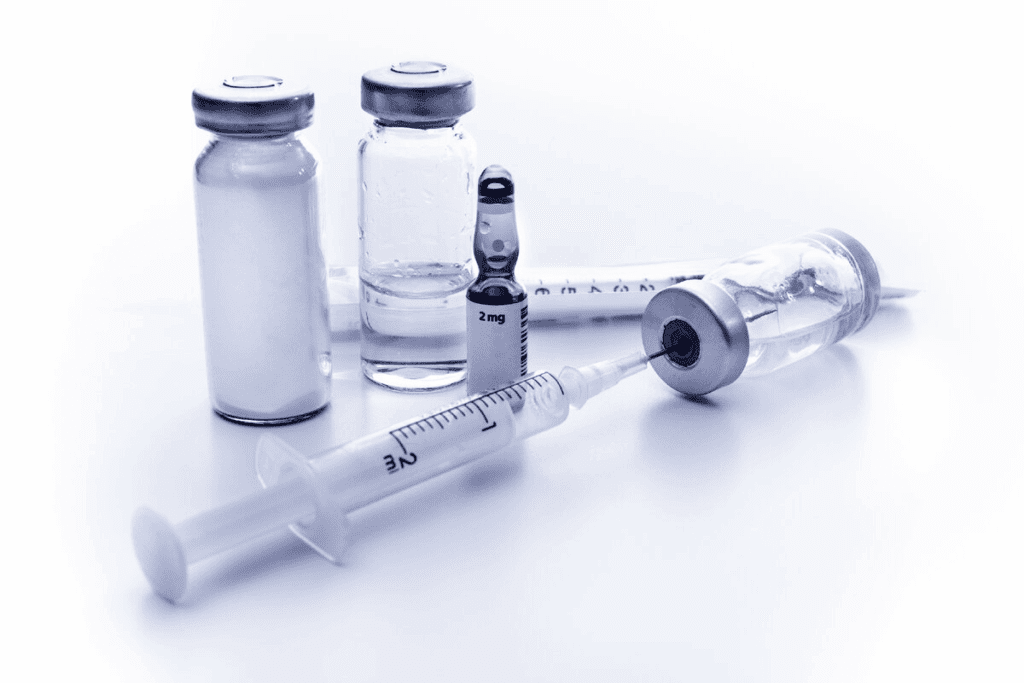Last Updated on November 27, 2025 by Ugurkan Demir

Post-nasal drip is when you make too much mucus that drips down your throat. Swallowing this extra mucus can make you feel sick and cause vomiting. This can really upset your stomach and make you uncomfortable. Effective methods on how to get rid of nausea from mucus (post-nasal drip) by thinning and clearing the drainage.
At Liv Hospital, we know how nasal drips can upset your stomach. We focus on you and use the best science to help. We offer detailed tests and treatments to fix post-nasal drip and its symptoms.
By looking into how post-nasal drip and nausea are linked, we can find ways to make you feel better. This helps improve your life quality.

Post nasal drip and nausea are linked through their causes and effects. This condition makes mucus drip down the throat, causing discomfort like nausea.
Post nasal drip happens when too much mucus from the nasal mucosa drips down the throat. It can be due to allergies, colds, sinus infections, or other issues. The mucus can be thick or thin, depending on the cause.
When the nasal mucosa makes too much mucus, it might be reacting to something or an infection. This can cause a sore throat, coughing, and nausea.
Post nasal drip causes nausea by making you swallow too much mucus. This mucus can irritate your esophagus and stomach, making you feel sick. Swallowing it all day can upset your stomach, but it’s worse when your stomach is empty.
Let’s look at how swallowing too much mucus affects your stomach:
Effect | Description |
Irritation of the Esophagus | Excess mucus can irritate the lining of the esophagus, leading to discomfort and nausea. |
Stomach Upset | Swallowing excess mucus can upset the stomach, specially when it’s empty. |
Nausea and Vomiting | The irritation and upset caused by excess mucus can lead to nausea and, in some cases, vomiting. |
Knowing how post nasal drip causes nausea helps you find ways to feel better and live better.

Swallowing too much mucus can irritate your stomach, which is worse when it’s empty. This is common in people with post nasal drip. They often swallow mucus without realizing it.
Swallowing mucus all day can upset your stomach. The proteins in mucus can irritate your stomach lining, causing nausea. This is worse when your stomach is empty, like late at night or early morning.
The Timing of Mucus Drainage
When you lie down, mucus can build up at the back of your throat. This makes it more likely to swallow it. Swallowing mucus can irritate your stomach more at night or when you wake up.
To lessen the stomach problems from swallowing mucus, you need to fix the root cause of post nasal drip. This might mean treating allergies, managing sinus infections, or using nasal decongestants. Drinking plenty of water can also help. It makes mucus thinner, which is less irritating to your stomach.
Knowing how swallowing mucus affects your stomach can help you take steps to prevent it. You can try to make less mucus and protect your stomach lining.
Studies show that infected mucus can harm the digestive tract, mainly for those with IBS. When postnasal drip gets infected, it can spread bacteria down the digestive system. This can make existing stomach problems worse.
For people with IBS or other stomach issues, infected mucus can make things worse. The bacteria in the mucus can upset the digestive system. This can cause more nausea, stomach pain, and other stomach problems.
Potential Complications of Infected Mucus
It’s important to understand how infected mucus affects the stomach. By treating the infection and reducing mucus, people can lower the risk of problems. This can also help ease their symptoms.
Condition | Effect of Infected Mucus | Potential Complications |
IBS | Irritation of the digestive system, increased nausea | Exacerbation of IBS symptoms, stomach pain |
Gastric Issues | Bacterial spread, increased gastrointestinal discomfort | Stomach pain, nausea, other gastrointestinal issues |
Knowing the link between infected mucus and stomach health is key. People can take steps to manage their condition and avoid complications. This includes keeping clean, drinking plenty of water, and seeing a doctor if symptoms get worse.
Many things can cause post nasal drip, which can make you feel sick. Knowing what causes it helps us find the right treatments.
Post nasal drip can be caused by allergies, infections, and the environment. Allergies make more mucus when you’re exposed to things like pollen or pet dander.
Infections can also cause it. This includes the common cold and sinus infections, which make too much mucus.
Other reasons include GERD (Gastroesophageal Reflux Disease). This is when stomach acid goes up into your throat. It can make you produce more mucus. Also, cold, dry air can make it worse.
Cause | Description |
Allergies | Increased mucus production in response to allergens like pollen, dust, or pet dander. |
Infections | Viral or bacterial infections, such as the common cold or sinus infections, leading to excess mucus. |
GERD | Stomach acid flowing back into the throat, irritating tissues and increasing mucus production. |
Environmental Factors | Cold, dry air exacerbating post nasal drip. |
Understanding what causes post nasal drip helps us manage it. This way, we can reduce symptoms like nausea.
Relieving nausea from post-nasal drip involves self-care and sometimes medicine. There are many ways to manage post-nasal drip and its symptoms. These methods can help reduce discomfort and nausea.
Hydration is key in making mucus thinner and easier to clear. Drinking water, herbal teas, or warm broths helps keep mucus thin. This makes it easier to expel.
Nasal irrigation is also effective. Using a saline solution to rinse the nasal passages can clear out excess mucus. It helps reduce nausea too.
There are also medical interventions for relief. Antihistamines, decongestants, and nasal sprays are used to manage post-nasal drip. They help with symptoms like nausea.
Some main ways to ease nausea from mucus include:
By trying these strategies, people can find relief from post-nasal drip nausea. It’s important to talk to a healthcare professional. They can help find the best treatment for your specific case.
Drinking enough water is key to making mucus less thick. This makes it easier to get rid of. Staying hydrated helps our bodies break down mucus, stopping it from clogging our throats and causing nausea.
It’s important to drink lots of fluids to keep mucus thin. Warm liquids, like tea and broth, are great because they help clear out mucus from our noses. Drinking these fluids often helps keep mucus under control.
Drinking warm liquids can also help. Herbal teas, like peppermint and ginger, warm us up and have anti-inflammatory effects. They can soothe our throats and lessen nausea.
It’s important to drink fluids all day long. Try to drink at least eight glasses of fluid a day to stay hydrated and keep mucus thin.
Using these hydration tips can help manage post-nasal drip and reduce nausea. This improves our comfort and overall health.
Making smart food choices can help cut down on post-nasal drip and nausea. Some foods make mucus worse, while others help ease symptoms.
Foods to Avoid
On the other hand, eating beneficial foods can help reduce post-nasal drip. These include:
Ginger is great for its anti-inflammatory effects and soothing nausea. You can enjoy ginger in tea, raw, or in dishes.
It’s also important to eat a balanced diet. Drinking enough water and eating foods rich in nutrients can help with mucus and comfort.
Some key dietary changes include:
Managing post nasal drip nausea at home is easy with simple remedies. These solutions tackle both symptoms and causes. Let’s look at some home remedies that offer great relief.
Saline rinses are a top choice. They clear out extra mucus, cutting down on post nasal drip. You can use a neti pot or a squeeze bottle with a nasal spray tip for the saline solution.
Steam inhalation is also a great option. It loosens and clears mucus from your nose, easing congestion fast. You can breathe in steam from hot water or use a steam humidifier.
Using a humidifier is also helpful. Dry air makes post nasal drip worse. Keeping your home, and bedroom, humid helps keep your nose moist and thins mucus.
Staying hydrated and eating ginger are other good ideas. Drinking lots of water thins mucus. Ginger’s natural anti-inflammatory properties soothe your stomach and lessen nausea.
Remedy | Description | Benefits |
Saline Rinses | Using a saline solution to clear nasal passages | Reduces mucus, alleviates congestion |
Steam Inhalation | Inhaling steam to loosen mucus | Provides quick relief from congestion |
Humidifier Use | Maintaining a humid environment | Keeps nasal passages moist, reduces mucus viscosity |
Making changes to our environment can help reduce post-nasal drip. These adjustments can make us feel better by easing the discomfort of this condition.
Using a humidifier is a smart move. It adds moisture to the air, which helps thin out mucus. This makes it easier to get rid of. A healthcare expert notes, “Keeping the air in your home just right can really help with this.”
Reducing allergens is also key. Things like dust mites, pet dander, and pollen can make post-nasal drip worse. Cleaning often and using special bedding can help keep these allergens away.
Changing how we sleep can also help. Sleeping with your head up can stop mucus from building up in your throat. This simple change can make a big difference.
It’s also important to watch out for cold, dry air. Wearing a scarf outside can warm the air before you breathe it in. This helps your nose and throat stay comfortable.
By making these changes, we can make our environment better for our health. Experts say that tackling this problem from all angles is usually the best way to manage it.
Many people find relief from post nasal drip and nausea with over-the-counter medications. These treatments can quickly manage symptoms and improve life quality.
Antihistamines help with allergy symptoms that cause post nasal drip. They reduce allergic reactions, which lowers mucus production. Consider diphenhydramine or loratadine for relief.
Decongestants reduce nasal swelling, making breathing easier. They come in oral forms like pseudoephedrine. This helps with nasal congestion from post nasal drip.
Nasal sprays are great for post nasal drip. Saline sprays moisturize and thin mucus, making it easier to clear. For severe congestion, oxymetazoline sprays offer quick relief.
Always read and follow the label when using over-the-counter medications. It’s also wise to talk to a healthcare professional. This is true if you have health conditions or take other medications.
Post-nasal drip can sometimes lead to complications that require medical intervention; let’s discuss when to take action. While many cases of post-nasal drip are manageable with home remedies, there are instances where medical help is necessary.
If you’re experiencing severe symptoms such as difficulty swallowing, bloody mucus, or fever, it’s important to seek medical attention. These symptoms can indicate a more serious underlying condition that requires professional evaluation.
Persistent nausea is another indicator that you may need to consult a healthcare provider. If your nausea is ongoing and interferes with your daily activities or is accompanied by other concerning symptoms, medical intervention may be necessary.
Symptom | Severity | Recommended Action |
Difficulty Swallowing | Severe | Seek Medical Attention |
Bloody Mucus | Severe | Seek Medical Attention |
Fever | Severe | Seek Medical Attention |
Persistent Nausea | Moderate to Severe | Consult Healthcare Provider |
It’s also important to monitor your symptoms and overall health. If you notice that your condition is not improving with home remedies or if you’re experiencing any of the severe symptoms mentioned, don’t hesitate to seek medical help.
We understand that managing post-nasal drip and associated nausea can be challenging. By knowing when to seek medical intervention, you can take a proactive approach to your health and ensure that any underlying conditions are addressed promptly.
Creating a personalized plan is key to fighting postnasal drip and nausea. Knowing the causes and using home remedies, lifestyle changes, and medical help can bring relief. This approach helps a lot.
We’ve talked about ways to manage postnasal drip. These include staying hydrated, changing your diet, and adjusting your environment. By making these strategies fit your needs, you can make a detailed plan for nausea relief.
Being proactive in dealing with postnasal drip is important. By adding these strategies to your daily routine, you can lessen nausea and feel better. A good plan can make symptoms go away and improve your life quality.
Yes, it can. Swallowing too much mucus irritates the stomach. This can make you feel sick and nauseous.
Swallowing too much mucus can upset your stomach. This irritation can cause discomfort and nausea.
Yes, it can. Infected mucus can harm your digestive system, worse if you already have stomach problems. It can spread bacteria and cause more issues.
Post nasal drip can be caused by allergies, infections, or structural problems. It can also be triggered by cold, dry air.
Drinking lots of fluids, like warm liquids, can help. It makes mucus thinner and easier to get rid of. This can also help with nausea.
Yes, there are. Eating foods that don’t make mucus worse and foods that fight inflammation, like ginger, can help.
Home remedies include saline rinses, steam inhalation, and using a humidifier. Making your environment less dry can also help.
Yes, they can. Medications like antihistamines, decongestants, and nasal sprays can help with symptoms.
If your symptoms are bad, last a long time, or if you have other serious signs like trouble breathing or severe stomach pain, see a doctor.
Yes, it can. Swallowing too much mucus can irritate your stomach and cause pain or discomfort.
Changing your environment can help. Avoid cold, dry air, reduce allergens, and sleep better to reduce post nasal drip.
Yes, it can. Swallowing mucus irritates your stomach and can make you feel nauseous.
Sometimes, yes. Severe post nasal drip can irritate your stomach so much that it makes you vomit.
Subscribe to our e-newsletter to stay informed about the latest innovations in the world of health and exclusive offers!